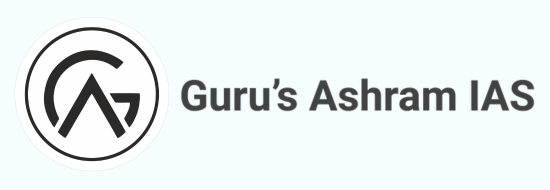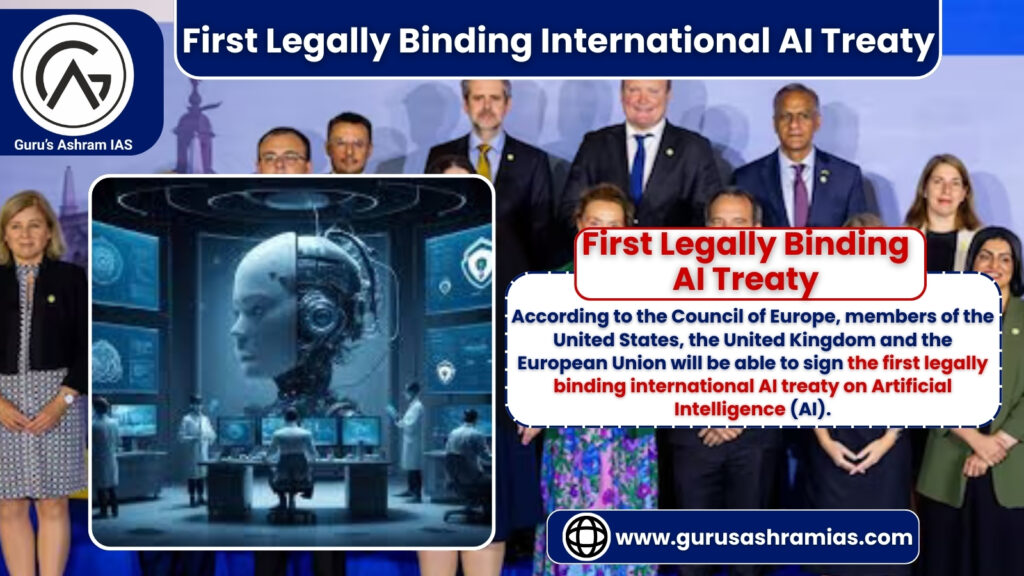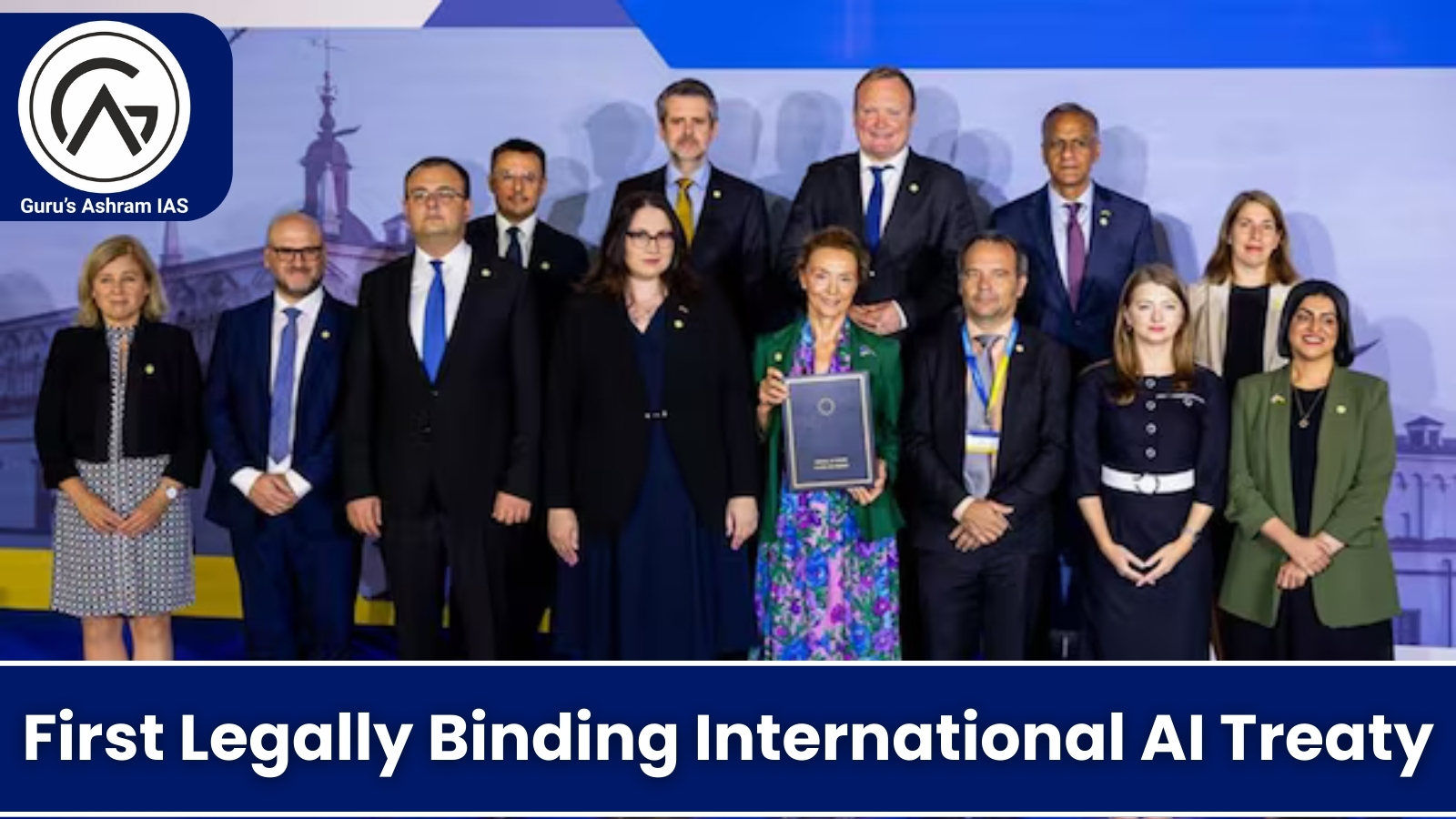The First Legally Binding International AI Treaty
- According to the Council of Europe, members of the United States, the United Kingdom and the European Union will be able to sign the first legally binding international AI treaty on Artificial Intelligence (AI).
The Council of Europe (COE):
- The Council of Europe (COE) is an international organization founded in 1949 and headquartered in Strasbourg, France.
- It is separate from the European Union (EU) and consists of 46 member states, including most European countries.
- The primary mission of the COE is to uphold and promote democracy, human rights and the rule of law in its member countries.
Key facts about the AI Convention:
- The Framework Convention on Artificial Intelligence and Human Rights, Democracy, and the Rule of Law, primarily emphasizes the protection of human rights of individuals affected by AI systems and operates independently of the AI Act of the European Union.
- The EU AI Act establishes comprehensive rules governing the development, deployment and use of AI systems in the EU’s internal market.
- The AI Convention had been in the works for several years and was adopted in May 2024 after consultations among 57 countries.
- It aims to reduce the risks associated with artificial intelligence while promoting innovation.
Terms of the Agreement:
Human-centered AI:
- The treaty mandates that AI systems must be developed and operated in line with human rights principles to ensure that they support and protect democratic values.
Transparency and accountability:
- The treaty stipulates that AI systems, especially those that interact with humans, must operate transparently.
- It also requires governments to provide legal remedies when human rights are violated by AI systems.
Risk Management and Monitoring:
- The treaty establishes a framework for assessing and managing risks associated with AI, as well as oversight mechanisms to ensure compliance with safety and ethical standards.
Protection against misuse:
- The treaty includes safeguards to prevent the use of AI to undermine democratic processes, including the protection of judicial independence and public access to justice.
The main enforcement mechanism:
The legal responsibilities:
- Signatory countries are required to take legislative and administrative measures to ensure that AI systems comply with Treaty principles such as human rights and accountability in AI deployment.
Monitoring and Inspection:
- The treaty establishes oversight mechanisms to monitor compliance with AI standards.
International Cooperation:
- The treaty promotes cooperation among signatories to harmonize AI standards, share best practices, and resolve international AI issues while recognizing the global nature of AI technologies.
Adaptability:
- The framework has been developed to be technology-neutral, allowing it to evolve with advances in AI and ensuring that standards remain relevant and enforceable despite the rapid advancement of AI technologies.
Exceptions to the treaty:
- The treaty applies to all AI systems except those used in national security or defence, although it still requires that these activities respect international law and democratic principles.
The importance of AI:
The broad format:
- The treaty was carefully drafted, taking a risk-based approach to the design, development, use and decommissioning of AI systems.
Wide applicability:
- It applies to AI systems in both the public sector and the private sector, with enforcement across different geographies.
Global Legal Standards:
- The Framework Convention on Artificial Intelligence is the first globally binding treaty of its kind, designed to meet the need for an international legal standard supported by countries from different continents with shared values.
Balance between innovation and risk:
- The treaty aims to promote the optimal use of AI while exploiting its benefits, effectively mitigating the risks associated with it and ensuring that the development of AI is consistent with human rights, rule of law and democratic principles.
Issues and concerns of the AI Convention:
Concerns about the implementation:
- “Despite being declared” “legally binding,” “the treaty has raised concerns due to the lack of punitive sanctions, such as fines or penalties, which weakens its deterrent effect from an enforcement perspective.”
Depending on the monitoring:
- Compliance with the treaty is ensured primarily through “monitoring” mechanisms, which may not be sufficient to effectively enforce the provisions of the treaty.
Balancing regulation and innovation:
- Striking the right balance between tighter regulation and fostering innovation is an important concern. Excessive regulatory burden can hamper the development of AI technologies, especially for small and medium enterprises (SMEs) and start-ups, thereby impacting competitiveness in the global AI market.
National Sovereignty vs. International Standards:
- Treaty provisions can conflict with national laws, leading to tensions between state sovereignties.
Addressing national security concerns:
- The conference seeks to balance AI governance with national security interests, while the intersection of AI with defence and intelligence activities presents challenges. This ensures that national security is not being compromised, while maintaining ethical AI practices requires a balancing act, which this treaty may face problems to achieve.
Conclusion:
- The “Framework Convention on Artificial Intelligence and Human Rights, Democracy and the Rule of Law” marks an important advance in the global governance of Artificial Intelligence. By incorporating important interconnections between AI, human rights, democracy and the rule of law, it addresses a significant lacuna in current regulatory structures.
- Its broad scope, including provisions on national security considerations, sets a benchmark for responsible AI governance, promotes international cooperation, and sets standards that can resonate both regionally and globally.





